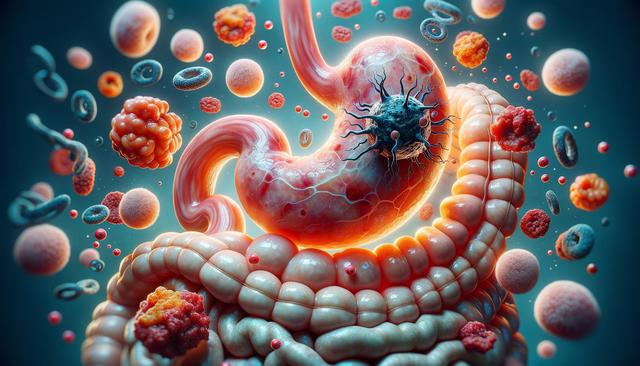Understanding Stomach Cancer and Its Symptoms
Stomach cancer, also known as gastric cancer, originates in the lining of the stomach and can progress slowly over time. It is often diagnosed in later stages because early signs are subtle or mistaken for common gastrointestinal issues. Recognizing stomach cancer symptoms early could significantly impact treatment outcomes. Common symptoms include persistent indigestion, a feeling of fullness after eating small amounts, nausea, and unexplained weight loss. In more advanced cases, patients might experience difficulty swallowing, vomiting blood, or black stools, which indicate internal bleeding. If you or someone you know is experiencing these symptoms, it is important to consult a healthcare provider for proper evaluation.
Stomach cancer is more common among older adults, with risk factors including tobacco use, a diet high in salted or smoked foods, and a family history of the disease. Additionally, chronic infection with Helicobacter pylori and certain genetic conditions can increase the likelihood of developing this cancer. Understanding these risk factors and symptoms can help individuals seek medical guidance sooner, potentially improving stomach cancer treatment success.
Diagnosis and Staging: What to Expect
A thorough diagnosis is essential in guiding the treatment plan for stomach cancer. If a physician suspects cancer based on symptoms and physical examination, they may recommend diagnostic procedures such as:
- Endoscopy – to visually inspect the stomach lining and collect tissue samples
- Biopsy – to confirm the presence of cancer cells
- Imaging tests – such as CT scans, PET scans, or X-rays to determine the extent of spread
Staging helps classify the cancer based on how far it has spread. Stomach cancer is typically staged from 0 to IV. Early-stage cancers (stages 0-I) are more likely to be treated successfully with surgery alone, while advanced stages may require a combination of therapies. Accurate staging is also crucial in discussing what is the cure for stomach cancer, as treatment options and success rates vary significantly based on the stage at diagnosis.
Once staging is complete, the medical team can recommend a personalized treatment plan. Patients are encouraged to ask questions about the diagnosis, potential side effects, and expected outcomes to make informed choices about their care.
Treatment Options and Their Considerations
Treatment for stomach cancer depends on several factors, including the stage, location of the tumor, and the patient’s overall health. Surgery is often a primary approach, especially if the cancer is localized. Procedures may involve partial or total removal of the stomach. For more advanced stages or cases where surgery alone is not sufficient, additional treatments are considered.
One common approach is chemo treatment for stomach cancer, which uses drugs to kill cancer cells or stop them from growing. Chemotherapy may be administered before surgery (neoadjuvant) to shrink the tumor or after surgery (adjuvant) to eliminate remaining cells. Radiation therapy can also be used in conjunction with chemotherapy or as a standalone treatment in specific cases.
Other treatment options may include:
- Targeted therapy – drugs that specifically target cancer cell mechanisms
- Immunotherapy – enhancing the body’s immune response to fight cancer
- Palliative care – focusing on symptom relief and quality of life for advanced cases
Each treatment comes with its own set of side effects and considerations. Understanding these can help patients and their families prepare for the journey ahead and evaluate what qualifies as the best stomach cancer treatment for their situation.
Managing Side Effects and Emotional Well-being
Undergoing treatment for stomach cancer often involves physical and emotional challenges. Side effects from surgery, chemotherapy, or radiation can include fatigue, nausea, loss of appetite, and digestive changes. Nutritional support becomes critical, as patients may find it difficult to eat enough due to discomfort or reduced stomach capacity.
To manage these challenges, medical teams usually include dietitians and supportive care specialists. They may recommend:
- Smaller, more frequent meals
- High-calorie, high-protein foods to maintain weight
- Supplements to address deficiencies
Emotional health is equally important. A cancer diagnosis can lead to anxiety, depression, and uncertainty. Support groups, counseling, and open communication with loved ones can ease these burdens. Care teams often include mental health professionals to support patients through the emotional aspects of their diagnosis and treatment plan, contributing to overall stomach cancer treatment success.
Staying informed, setting realistic expectations, and actively participating in care decisions can empower patients and provide a sense of control during a difficult time.
Long-Term Outlook and Monitoring
Following initial treatment, ongoing monitoring is essential to detect any signs of recurrence and to manage long-term effects of therapy. Regular follow-up appointments typically include physical exams, blood tests, and imaging studies. In some cases, additional endoscopies may be needed to check for changes in the stomach lining.
While the question of what is the cure for stomach cancer doesn’t have a one-size-fits-all answer, remission is possible, especially when diagnosed early and treated effectively. Advances in medical research continue to improve outcomes, and some patients may live cancer-free for years. For others, the disease may become a chronic condition that requires ongoing management.
Maintaining a healthy lifestyle, including a balanced diet, regular physical activity, and avoiding tobacco and alcohol, may help improve long-term outcomes. Participation in clinical trials may also offer access to new and promising therapies. Patients are encouraged to discuss these options with their oncology team to make well-informed decisions tailored to their unique needs and goals.
Conclusion: Navigating the Journey Ahead
Dealing with stomach cancer involves more than just medical decisions—it encompasses emotional resilience, informed choices, and a strong support system. By understanding the signs, exploring treatment options like chemo treatment for stomach cancer, and staying engaged with a healthcare team, patients can take an active role in their care. While there may not be a simple answer to what is the cure for stomach cancer, many individuals achieve lasting remission and improved quality of life through early detection and comprehensive treatment. Staying informed and connected to resources can make a meaningful difference on this journey.













